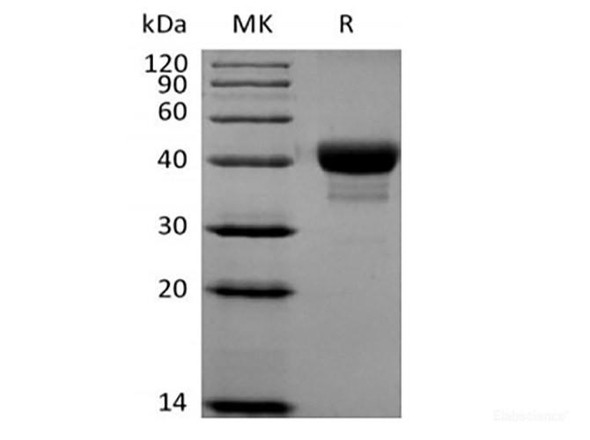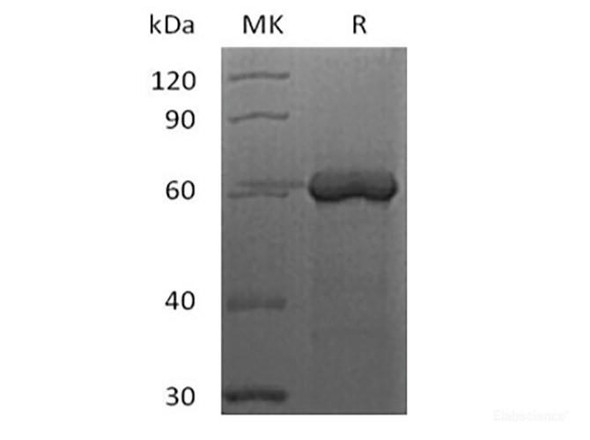Description
| Product Name: | Recombinant Human Mucin-1/MUC-1 (C-Fc-Avi) Biotinylated |
| Product Code: | RPES6307 |
| Size: | 20µg |
| Species: | Human |
| Expression Host: | HEK293 Cells |
| Synonyms: | Mucin-1, MUC-1, Breast carcinoma-associated antigen DF3, Cancer antigen 15-3, CA 15-3, Carcinoma-associated mucin, Episialin, H23AG, Krebs von den Lungen-6, KL-6, PEMT, Peanut-reactive urinary mucin, PUM, Polymorphic epithelial mucin, PEM, Tumor-associated epithelial membrane antigen, EMA, Tumor-associated mucin, CD227, MUC1 |
| Mol Mass: | 44 kDa |
| AP Mol Mass: | 55-75 kDa |
| Tag: | C-Fc-Avi |
| Purity: | > 95 % as determined by reducing SDS-PAGE. |
| Endotoxin Level: | < 1.0 EU per μg of the protein as determined by the LAL method. |
| Bio Activity: | Testing in progress |
| Sequence: | Pro24-Gly167 |
| Accession: | P15941-11 |
| Storage: | Generally, lyophilized proteins are stable for up to 12 months when stored at -20 to -80°C. Reconstituted protein solution can be stored at 4-8°C for 2-7 days. Aliquots of reconstituted samples are stable at < -20°C for 3 months. |
| Shipping: | This product is provided as lyophilized powder which is shipped with ice packs. |
| Formulation: | Lyophilized from a 0.2 μm filtered solution of PBS, pH 7.4. Normally 5 % - 8 % trehalose, mannitol and 0.01% Tween80 are added as protectants before lyophilization. Please refer to the specific buffer information in the printed manual. |
| Reconstitution: | Please refer to the printed manual for detailed information. |
| Background: | Mucin-1, is a membrane-bound protein that is a member of the mucin family. Mucins are O-glycosylated proteins that play an essential role in forming protective mucous barriers on epithelial surfaces. These proteins also play a role in intracellular signaling. This protein is expressed on the apical surface of epithelial cells that line the mucosal surfaces of many different tissues including lung, breast stomach and pancreas. MUC-1 exclusively located in the apical domain of the plasma membrane of highly polarized epithelial cells. MUC-1 can act both as an adhesion and an anti-adhesion protein. This protein may provide a protective layer on epithelial cells against bacterial and enzyme attack. MUC-1 participated in modulates signaling in ERK, SRC and NF-kappa-B pathways. In activated T-cells, MUC-1 influences directly or indirectly the Ras/MAPK pathway. MUC-1 promotes tumor progression and regulates TP53-mediated transcription and determines cell fate in the genotoxic stress response. |






